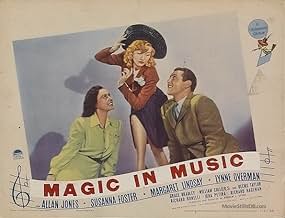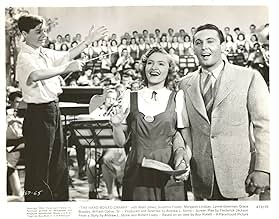Ajouter une intrigue dans votre langueA young girl fresh out of reform school who is singing in a burlesque show is offered a scholarship to a famous music camp by the camp's owner. She must overcome the suspicions of the other ... Tout lireA young girl fresh out of reform school who is singing in a burlesque show is offered a scholarship to a famous music camp by the camp's owner. She must overcome the suspicions of the other students in order to prove herself.A young girl fresh out of reform school who is singing in a burlesque show is offered a scholarship to a famous music camp by the camp's owner. She must overcome the suspicions of the other students in order to prove herself.
Diana Lynn
- Dolly Loehr
- (as Dolly Loehr)
Histoire
Le saviez-vous
- AnecdotesOne of over 700 Paramount Productions, filmed between 1929 and 1949, which were sold to MCA/Universal in 1958 for television distribution, and have been owned and controlled by Universal ever since; its earliest documented telecast took place in Minneapolis Sunday 9 August 1959 on WTCN (Channel 11).
- GaffesKaye Connor, who is faking laryngitis and being unable to talk so that Toodles can sing in her place, speaks briefly in a subsequent scene, before her charade is later revealed.
- ConnexionsReferenced in Arena: The Orson Welles Story: Part 1 (1982)
- Bandes originalesCarmen
Written by Georges Bizet
Commentaire en vedette
It's amazing how well this movie turned out, given all the hardships it faced during production. The film, about Interlochen, was shot at Lake Arrowhead in California. A better storyline could have been chosen than that of a burlesque singer who's taken in by the son of the camp's founder and "reformed". Most of the kids in the film----including three of the four who had major roles----had little or no acting experience. The producers, on a tight budget, had to send all of the non-contract kids home halfway through shooting and had to cut production short by a few weeks. Because of this, many scenes from the script were never shot, and the film shows this lack of continuity.
In spite of all of that, the movie ends up being very well-done. Unlike a similar film two years earlier, "They Shall Have Music," this movie doesn't just include kids, it's ABOUT kids. And frankly, the kids carry the movie and steal the show here. Their lack of acting experience only adds to the spontaneity of the film. Kaye Connor, one of the few kids with any acting background, does a good job of covering for the others when needed. Prodigy Patricia Travers is surprisingly effective portraying a spoiled brat. 14 year old Heimo Haitto is as unbuttoned in the movie as he was in real life. And a young Diana Lynn (as Dolly Loehr) appears in the first of her many ingénue' roles.
Musically, the film is excellent. The kids actually perform all the music they're seen playing, and they do so as well as professionals. This isn't surprising, since many of the kids in the orchestra, who came from various training orchestras in the Los Angeles area (notably the Meremblum orchestra) were also in the youth orchestra of the Goldwyn film "They Shall Have Music", made two years earlier. Opera stars Richard Bonelli, Tandy MacKenzie, and Irra Petina appear in the finale. Works performed are by Wagner (from the operas "Rienzi" and "Tannhäuser"), Sousa (Stars and Stripes Forever), Anton Rubinstein (Romance in E-flat, sung by Connor and performed by Travers), Brahms (Hungarian Rhapsody no. 5, performed by Haitto), Grieg (Piano Concerto, performed by the orchestra and Loehr/Lynn), Gounod (from Faust) and Bizet (Carmen). The finale, which features Faust and Carmen performed and sung simultaneously, is a wonder all by itself.
Foster is given plenty of chance to show off her incredible range, hitting and holding a near-impossible B flat over High C (by contrast, the great Lily Pons could only reach F over High C, although admittedly, Pons had a much more dynamic voice). She also does excellent imitations of Marlene Dietrich, Bonnie Baker, and Judy Canova, and a reasonable one of Katherine Hepburn.
All in all, this is a wonderful film that's been terribly neglected. Good luck finding a copy of it anywhere---it took me six months. Maybe we can persuade one of the classic movie cable stations to play it.
In spite of all of that, the movie ends up being very well-done. Unlike a similar film two years earlier, "They Shall Have Music," this movie doesn't just include kids, it's ABOUT kids. And frankly, the kids carry the movie and steal the show here. Their lack of acting experience only adds to the spontaneity of the film. Kaye Connor, one of the few kids with any acting background, does a good job of covering for the others when needed. Prodigy Patricia Travers is surprisingly effective portraying a spoiled brat. 14 year old Heimo Haitto is as unbuttoned in the movie as he was in real life. And a young Diana Lynn (as Dolly Loehr) appears in the first of her many ingénue' roles.
Musically, the film is excellent. The kids actually perform all the music they're seen playing, and they do so as well as professionals. This isn't surprising, since many of the kids in the orchestra, who came from various training orchestras in the Los Angeles area (notably the Meremblum orchestra) were also in the youth orchestra of the Goldwyn film "They Shall Have Music", made two years earlier. Opera stars Richard Bonelli, Tandy MacKenzie, and Irra Petina appear in the finale. Works performed are by Wagner (from the operas "Rienzi" and "Tannhäuser"), Sousa (Stars and Stripes Forever), Anton Rubinstein (Romance in E-flat, sung by Connor and performed by Travers), Brahms (Hungarian Rhapsody no. 5, performed by Haitto), Grieg (Piano Concerto, performed by the orchestra and Loehr/Lynn), Gounod (from Faust) and Bizet (Carmen). The finale, which features Faust and Carmen performed and sung simultaneously, is a wonder all by itself.
Foster is given plenty of chance to show off her incredible range, hitting and holding a near-impossible B flat over High C (by contrast, the great Lily Pons could only reach F over High C, although admittedly, Pons had a much more dynamic voice). She also does excellent imitations of Marlene Dietrich, Bonnie Baker, and Judy Canova, and a reasonable one of Katherine Hepburn.
All in all, this is a wonderful film that's been terribly neglected. Good luck finding a copy of it anywhere---it took me six months. Maybe we can persuade one of the classic movie cable stations to play it.
- Tom_Barrister
- 22 mars 2004
- Lien permanent
Meilleurs choix
Connectez-vous pour évaluer et surveiller les recommandations personnalisées
Détails
- Date de sortie
- Pays d’origine
- Langue
- Aussi connu sous le nom de
- There's Magic in Music
- Lieux de tournage
- société de production
- Consultez plus de crédits d'entreprise sur IMDbPro
- Durée1 heure 20 minutes
- Couleur
- Rapport de forme
- 1.37 : 1
Contribuer à cette page
Suggérer une modification ou ajouter du contenu manquant

Lacune principale
By what name was The Hard-Boiled Canary (1941) officially released in India in English?
Répondre



















